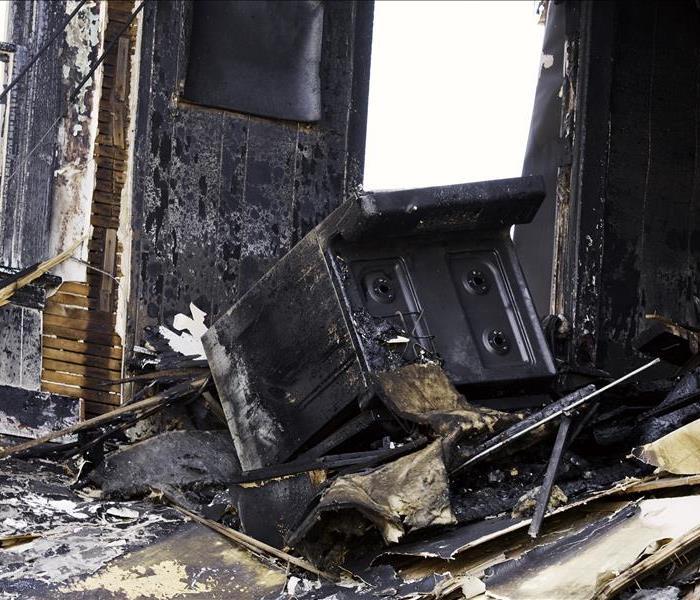What Do I Use To Clean My House After Fire Damage In Brigantine?
5/23/2020 (Permalink)
 Don’t despair when facing fire damage in your kitchen. Contact our experienced SERVPRO team for effective remediation services.
Don’t despair when facing fire damage in your kitchen. Contact our experienced SERVPRO team for effective remediation services.
Full Restoration Might Require Several Cleaning Approaches, But SERVPRO Can Help You Complete the Process Faster
Cleaning a house after a fire incident in Brigantine is like solving a puzzle where you have to fit in different cleaning approaches together to achieve the goal of restoring your home to its preloss state. Even after a small fire, you might have a considerable cleaning challenge ahead. Involving a professional cleaning team can help ensure you get the results you want faster or guarantee a better outcome.
What cleaning tasks are typical after fire damage incidents in Brigantine?
- Removal of residues deposited on surfaces such as walls
- Cleaning small items such as toys and lighting fixtures
- Removal of particulate matter and aerosols left by smoke in the air
- Cleaning fabrics
Whether a Brigantine fire was big or small, residues tend to accumulate on vast surfaces such as walls. The combustion processes generate most of the residues then smoke movements transfer them to different surfaces. Residues can also form on a surface as it deteriorates because of exposure to extreme heat.
The process of cleaning residues from surfaces can vary depending on several factors, including:
- Amount of residues deposited
- Type of residues
- Type or age of the underlying material
When dealing with small amounts of dry smoke residues, it is easier to clean them by wiping the affected surfaces with a sponge or cloth. Vacuuming can also help, especially if the surface is not even. Our SERVPRO technicians also improve the process by using the spray and wipe technique whereby we spray lightly or mist a cleaning product onto a surface before wiping with a dry cleaning towel.
Wiping areas caked with layers of residue may not work, or if it does, you have to put in considerable elbow grease. The same happens when dealing with unique residues produced by fuel oil or protein fires. Agitation and the use of stronger cleaning solutions help remove such residues. In most cases, the cleaned surfaces require refinishing after removing all soils, so the use of abrasive cleaning supplies like steel wool pads is possible.
Cleaning processes can have adverse effects on the underlying material, depending on the physical traits of such materials. For instance, wood has cellulose, which readily absorbs cleaning solutions so you might succeed in removing soils only to end up with water damage. Cleaning processes such as agitation or the use of chemicals can damage a surface finish.
How do I clean small items after a fire?
Many small items, including kids' toys and fixtures such as chandeliers, require cleaning to remove soot or other residues they collect during a fire. The small size of the items, the shapes, and the hidden sections make cleaning such items challenging. Our SERVPRO technicians can help by disassembling utility items to simplify cleaning. We also use immersion techniques such as ultrasonic cleaning for non-electronic items. The cleaning system uses sound to form and implode millions of vapor bubbles instantaneously. The collapsing bubbles create energy that cleans residues.
How do I ensure there is clean residue-free air in the house?
The deposits that end up on surfaces move through the air. Although most settle on surfaces, some remain suspended in the air as particles or aerosols. Air movements, especially from the HVAC system, can also re-circulate residues into the air.
It takes different steps to ensure there is clean air in the house. Ventilating the areas affected by the fire helps push out the residue-filled air. For the best results, the use of equipment such as axial air movers, which displace huge volumes of air, is necessary. Cleaning the HVAC system, especially if its blower was on during the fire or replacing filters, helps eliminate the recirculation of residues back into the indoor air.
Sometimes, the problem might not be residues in the air, rather its bad odor. In case cleaning the house and all contents does not eliminate the bad odor, deodorization is essential. The simplest way to deodorize is to mix water-based deodorizers with the cleaning solutions to leave a sweet scent in cleaned areas. Our SERVPRO technicians can also help address serious odor issues by using advanced deodorization procedures such as ULV or thermal fogging. Such methods deliver a pairing agent or another type of deodorizer in an atomized form allowing deep penetration into materials for better neutralization of all odors.
The challenging process of cleaning fire-damaged property in Hamilton Township, Atlantic City, or Galloway is simpler with assistance from SERVPRO of Atlantic City / Hamilton / Hammonton. Call us at (609) 965-0885 to assist. We're Faster To Any Size Disaster.





 24/7 Emergency Service
24/7 Emergency Service